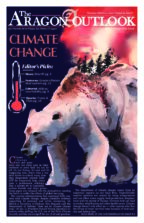
On Feb. 3, the Aragon Robotics FIRST Tech Challenge team competed in the Centerstage FTC competition at Jefferson High School, placing twelfth out of fifteen teams in the FTC Northern California Peninsula League and winning one out of four matches. FTC is the only robotics team at Aragon that competes in FIRST Tech Challenge tournaments, a series of two teams versus two teams matches where the winners advance to regionals, based on tournament performance.
With their build season beginning in September and ending after the tournament, FTC participated in three competitions before the final league competition.
“We have a really long build season that basically allows us to [compete] throughout our season,” said senior and FTC captain Jessica Li. “We see our robot perform and then [consider,] ‘What do we want to change?’”
In this year’s competition, robots score points by picking up plastic hexagon pieces, called pixels, and placing them on tape lines in the playing field and on a backboard. Points are designated based on the location of the pixels. Teams can also earn points by their robots performing two additional tasks in the 30-second end game period: hanging from the bars on top of the playing field and launching paper airplanes over the bars.
One obstacle the team faced was coming back from a poor performance in their first competition.
“Our season started off really slow, and that’s the time where you need to be the fastest,” said senior and mechanical lead Stuti Goel. “And so going into our first competition, we were not ready at all. We did not put in the hours that we should have put in [because] we had a lot of issues with supervision this year.”
Another challenge was that five seniors on the team graduated last year.
“The main difficulty is working with the ability and capabilities that we have now to foster growth so that we can keep the knowledge and the skills in the team,” Li said. “[However, the new members] contributed to the robot this time with the paper airplane launcher which has worked really well.”
Despite the loss of the seniors, the team, which has twelve members, comments on its healthy dynamic.
“Collaboration and communication [with] the entire team is great and working with them is really easy,” said freshman and mechanical trainee Zack Li. “[Everyone is] very supportive [and] capable.”
In order to prepare for the competition, the team refined their robot.
“Mechanically, we [redesigned] a bunch of features of the robot, [such as] the outtake box [which removes the pixels] and even the drive chain[because the mechanisms] hadn’t been working too well,” said sophomore and mechanical member Max Mendell.
The team also prepared for the 30-second autonomous period of the match, when robots are controlled through pre-programmed commands. For the other stages, the 2-minute driver control period and the end game period, the robot was directed by Aragon’s drivers, Goel and junior and mechanical lead Sam Gulchin.
“[We did] a lot of testing of the programming for the autonomous [period,] which is… programming-driven,” said junior and programming lead Rocco Lamberti. “The driver [got] some practice in … learn[ing] how to pick up the [pixel] better.”
Going into the competition, Li adds that the FTC team’s objective was not to advance to regionals, but to improve their robot.
“Our goal mainly [was to] achieve a better level of reliability with our robot,” Li said. “In the past, we have had a lot to fix in the middle of the competition. I’m hoping that our improvements to the bot will make it more consistent.”
This benefitted the team during the competition.
“We did really [well],” Mendell said. “Our robot came together… [and] we didn’t have significant mechanical issues.”
Despite the preparation, Aragon struggled with one of their autonomous functions.
“[During the] autonomous [period] they randomized which path [the robot had] to take,” Li said. “[In] one out of [the] three pathways, [the programming] was a little bit more sketchy [and] we rolled [that pathway] for the majority of our matches.”
In one match, Aragon and another team competed against an alliance of teams including the second most successful team in the league.
“We ended up losing that game by one point, but that was still a big victory for us,” Zack Li said. “…[A]ll the mechanisms work[ed] well… [and] we scored a really good paper airplane launch, which made us a lot of points… [W]e also worked pretty well with the other team.”
In another match, Aragon’s partner team’s robot broke down while the match was taking place.
“[T]hat gave us a lot of penalties,” Zack Li said. “And so that was pretty bad for us, but overall, I think [we had] a pretty good experience with other teams.”
Aragon ranked first for the Motivate Award, which focused on teamwork and outreach of STEM to the community, and second for the Think Award, an engineering-oriented award. However, Jessica Li feels that they could have done better in their judging session.
“Overall this season, we did really well in all aspects of our judging criteria,” Jessica Li said. “Our judging session did not go as well as we expected because we weren’t able to present that to the judges within the 10 minutes [allotted for judging].”
Regardless of the results, Li commends the team’s positive attitude.
“In the past years, we really struggled with the mindset that winning is most important, this year specifically,” Li said. “But at the competition, no one got particularly sad about our results. We were always energetic[ally] cheering for the team and seeing our bot perform brought enough fulfillment and happiness [for us].”
The FIRST Tech Challenge team will spend the rest of the year enhancing their skills for their 2024-25 season.



